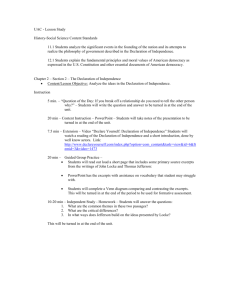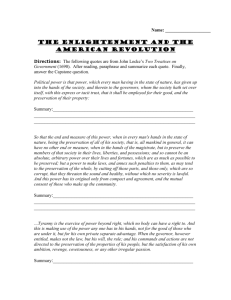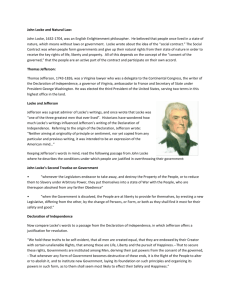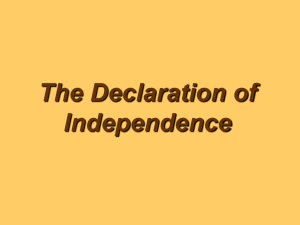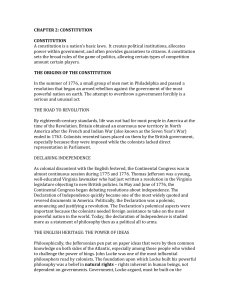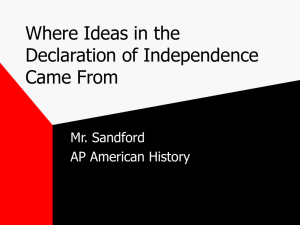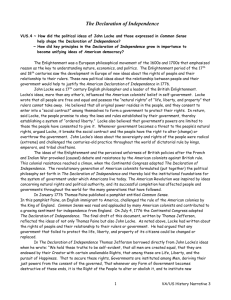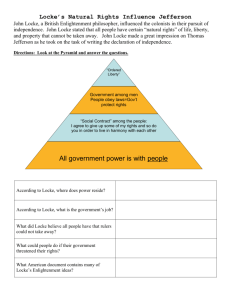Name: Homework Assignment: The American Conception of Rights
advertisement
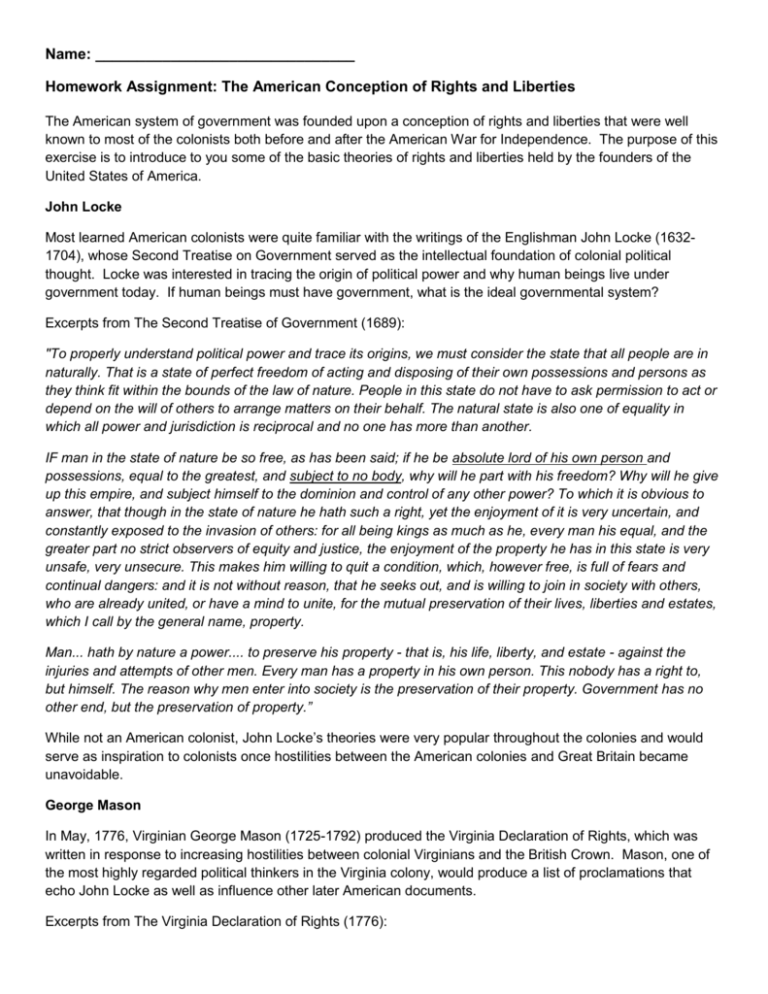
Name: _______________________________ Homework Assignment: The American Conception of Rights and Liberties The American system of government was founded upon a conception of rights and liberties that were well known to most of the colonists both before and after the American War for Independence. The purpose of this exercise is to introduce to you some of the basic theories of rights and liberties held by the founders of the United States of America. John Locke Most learned American colonists were quite familiar with the writings of the Englishman John Locke (16321704), whose Second Treatise on Government served as the intellectual foundation of colonial political thought. Locke was interested in tracing the origin of political power and why human beings live under government today. If human beings must have government, what is the ideal governmental system? Excerpts from The Second Treatise of Government (1689): "To properly understand political power and trace its origins, we must consider the state that all people are in naturally. That is a state of perfect freedom of acting and disposing of their own possessions and persons as they think fit within the bounds of the law of nature. People in this state do not have to ask permission to act or depend on the will of others to arrange matters on their behalf. The natural state is also one of equality in which all power and jurisdiction is reciprocal and no one has more than another. IF man in the state of nature be so free, as has been said; if he be absolute lord of his own person and possessions, equal to the greatest, and subject to no body, why will he part with his freedom? Why will he give up this empire, and subject himself to the dominion and control of any other power? To which it is obvious to answer, that though in the state of nature he hath such a right, yet the enjoyment of it is very uncertain, and constantly exposed to the invasion of others: for all being kings as much as he, every man his equal, and the greater part no strict observers of equity and justice, the enjoyment of the property he has in this state is very unsafe, very unsecure. This makes him willing to quit a condition, which, however free, is full of fears and continual dangers: and it is not without reason, that he seeks out, and is willing to join in society with others, who are already united, or have a mind to unite, for the mutual preservation of their lives, liberties and estates, which I call by the general name, property. Man... hath by nature a power.... to preserve his property - that is, his life, liberty, and estate - against the injuries and attempts of other men. Every man has a property in his own person. This nobody has a right to, but himself. The reason why men enter into society is the preservation of their property. Government has no other end, but the preservation of property.” While not an American colonist, John Locke’s theories were very popular throughout the colonies and would serve as inspiration to colonists once hostilities between the American colonies and Great Britain became unavoidable. George Mason In May, 1776, Virginian George Mason (1725-1792) produced the Virginia Declaration of Rights, which was written in response to increasing hostilities between colonial Virginians and the British Crown. Mason, one of the most highly regarded political thinkers in the Virginia colony, would produce a list of proclamations that echo John Locke as well as influence other later American documents. Excerpts from The Virginia Declaration of Rights (1776): “I. That all men are by nature equally free and independent, and have certain inherent rights, of which, when they enter into a state of society, they cannot, by any compact, deprive or divest their posterity; namely, the enjoyment of life and liberty, with the means of acquiring and possessing property, and pursuing and obtaining happiness and safety. II. That all power is vested in, and consequently derived from, the people; that magistrates are their trustees and servants, and at all times amenable to them. III. That government is, or ought to be, instituted for the common benefit, protection, and security of the people, nation or community; of all the various modes and forms of government that is best, which is capable of producing the greatest degree of happiness and safety and is most effectually secured against the danger of maladministration; and that, whenever any government shall be found inadequate or contrary to these purposes, a majority of the community hath an indubitable, unalienable, and indefeasible right to reform, alter or abolish it, in such manner as shall be judged most conducive to the public weal.” Thomas Jefferson That following July 4, delegates to the Second Continental Congress, assembled in Philadelphia to formally vote for independence from Great Britain, approved The unanimous Declaration of the thirteen united States of America. We now refer to this document as the Declaration of Independence. The author, a Virginian named Thomas Jefferson, was well known to the colonists as an astute political thinker whose knowledge of political theories affirming the rights of Englishmen would make him an excellent choice for expressing the political thought of the revolutionaries. Excerpts from The unanimous Declaration of the thirteen united States of America (1776): “We hold these truths to be self-evident, that all men are created equal, that they are endowed by their Creator with certain unalienable Rights, that among these are Life, Liberty and the pursuit of Happiness. — That to secure these rights, Governments are instituted among Men, deriving their just powers from the consent of the governed, — That whenever any Form of Government becomes destructive of these ends, it is the Right of the People to alter or to abolish it, and to institute new Government, laying its foundation on such principles and organizing its powers in such form, as to them shall seem most likely to effect their Safety and Happiness. Prudence, indeed, will dictate that Governments long established should not be changed for light and transient causes; and accordingly all experience hath shewn that mankind are more disposed to suffer, while evils are sufferable than to right themselves by abolishing the forms to which they are accustomed. But when a long train of abuses and usurpations, pursuing invariably the same Object evinces a design to reduce them under absolute Despotism, it is their right, it is their duty, to throw off such Government, and to provide new Guards for their future security.” Questions: 1. If John Locke is correct, what is the natural state of man like? Would you want to live in such a state? Why or why not? ________________________________________________________________________________________ ________________________________________________________________________________________ ________________________________________________________________________________________ ________________________________________________________________________________________ ________________________________________________________________________________________ 2. According to Locke, why do men leave the natural state and create government? ________________________________________________________________________________________ ________________________________________________________________________________________ ________________________________________________________________________________________ ________________________________________________________________________________________ ________________________________________________________________________________________ 3. How are George Mason’s ideas similar to John Locke’s? ________________________________________________________________________________________ ________________________________________________________________________________________ ________________________________________________________________________________________ ________________________________________________________________________________________ ________________________________________________________________________________________ 4. How are Thomas Jefferson’s ideas similar to John Locke’s? ________________________________________________________________________________________ ________________________________________________________________________________________ ________________________________________________________________________________________ ________________________________________________________________________________________ ________________________________________________________________________________________ 5. How are Thomas Jefferson’s ideas similar to George Mason’s ideas? ________________________________________________________________________________________ ________________________________________________________________________________________ ________________________________________________________________________________________ ________________________________________________________________________________________ ________________________________________________________________________________________
